I just spent four days sequestered in a grassy compound in the suburbs of Quito, Ecuador with 24 Colombian refugee youth leaders and a handful of local youth, laughing at their skits, crying with their stories and blown away by their drive and ambition.
Millions of young people around the world live in displacement. Being refugees, they’re rarely seen as individuals on the cusp of adulthood, with hopes and dreams. Their potential often goes un-tapped and they’re rarely asked about the future they’d like to create. They’re even less likely to be offered support to get there. Despite their numbers and their potential, youth are often left out of humanitarian activities and programs intended to serve refugees.
To address this issue, WRC and UNHCR are coordinating the Global Refugee Youth Consultations, which bring together refugee and host country youth (aged 15 – 24) to discuss the challenges they face, to help identify their risks and priorities, and to practice communicating them. In each country, the process culminates in a meeting where government ministries, donors, UN agencies and NGOs come to hear the young people’s recommendations.
The activities help young people think through their situation as youth and as refugees, gain experience in public speaking, networking and advocacy, and find solutions for the problems they face. They’re challenged to unpack the public perceptions of refugee youth vs. reality.
The young people are the main actors in this process, but frankly it builds the capacity of everyone involved. UNHCR staff get to work closely with a population that’s too often only known in the abstract. WRC gets new primary data on the populations we serve, and how best to help refugee youth organize. The stakeholders in each country are challenged to sit face-to-face with these often vulnerable young people and be held to account.
OK but what happens when the consultation is over? Already the youth are sharing ideas and networking through social media. In a few countries the participants decided to create a national network of youth groups, and we’ve heard rumors that funding is starting to coalesce to help them. As with any kind of social development work, projects will take shape around common goals, grants will be made, and some partnerships will survive while others fall away. For the moment, the Colombian and Ecuadorean youth said it’s up to them to capture the local momentum in Ecuador.
Consultations have already taken place in Malta, Uganda, Jordan, Morocco and Ecuador with future forums planned in Chad, Turkey, Zambia and Pakistan. Some of the youth from each national consultation will be selected to participate in a global consultation in Geneva in June. Finally, a list of Core Actions for Refugee Youth will be presented at UNHCR's annual meeting with governments this October.
In each country we hope the stakeholders make commitments to work with the youth. By the end of the last day in Quito I saw government officials asking young people for their contact info. I saw NGO and UN people making notes of the youths’ priorities for use in proposals and policy documents. And I saw a list of commitments that agencies made to refugee youth right there in the meeting hall. I also saw a few exhausted young people with their heads on the table taking a well-deserved nap.


